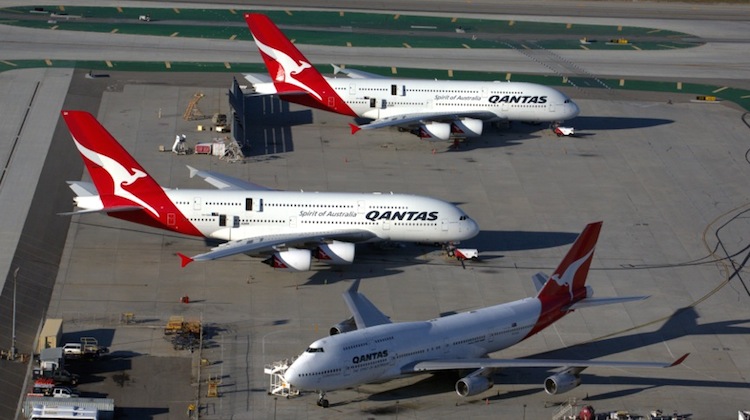
Qantas is restructuring its international fares to fold the fuel surcharge into its base fares, a move that will be a benefit for travellers redeeming Qantas Frequent Flyer points. Yet despite record low fuel prices, and an IATA-estimated industry-wide increase in profits of 17 per cent, the airline is not intending to match rival Virgin Australia’s pledge last week to cut those base fares in line with fuel costs.
“Overall fares will not change as a consequence of the surcharge gradually being absorbed into base fares, as prices advertised to customers already include taxes and charges. Qantas will continue to price competitively, with fares moving in line with the broader market,” the airline said in a statement. Qantas’s changes will start coming into effect on Wednesday, January 28.
Qantas estimates that folding fuel surcharges into base fares – the cost of which are covered by redeeming frequent flyer points – will cause redemption booking pricing to drop by “up to $110 in economy and up to $130 in premium economy on some routes for a return flight”. Actual figures “will vary across the network but average around 14 per cent,” Qantas says.
Fuel surcharges have only been tangentially related to the cost of fuel in the decade since their widespread introduction. Their purpose for most airlines has not been to track costs against the price of fuel – which halved in the second half of 2014 and have continued to slide this year. Rather, fuel surcharges have served the function of a dynamic pricing mechanism, allowing airlines to quickly and easily vary the costs of a large number of tickets across fare buckets without having to spend a significant amount of time and money refiling the base fares across global distribution systems.
As a result, many frequent flyer industry insiders objected on principle to adding fuel surcharges to redemption bookings.
Elsewhere, Air Canada has simply renamed its fuel surcharge mechanism as a “Carrier Surcharge”, a move that is perhaps untenable in Australia after a campaign by independent Senator Nick Xenophon and moves to investigate by the ACCC.
Qantas CEO Alan Joyce was clear today about the need for Qantas’s absorption of fuel surcharges into base fares to also maintain yields.
“The dynamics of this market have seen Qantas International post significant losses in the past two years. Even now, yields remain significantly below pre-GFC levels and like the rest of the industry our strategy is to keep strengthening them,” Joyce confirmed.
Joyce framed Qantas’s thinking in the context of IATA projections on the benefits of lower fuel prices to airlines. “Factoring in lower fuel prices, IATA estimates that the net profit airlines make per passenger this year will rise by just $1 compared with last year, from $6 to $7.”
That $1, of course, is a 17 per cent increase – a windfall that any business would be pleased to receive. Airlines will be under scrutiny this year, with passengers, analysts and regulators keen to see precisely how fuel prices affect fares and profits.
“In a highly competitive environment where customers are already paying less than they were several years ago, lower oil prices can help put the industry on a more sustainable footing. It means airlines are in a better position to invest in the new aircraft, new lounges and new routes that ultimately benefit customers,” Joyce said.
The problem is that new, more fuel-efficient aircraft become less pressing when oil prices are through the floor. The business case for investing in half-generational airframe upgrades like Airbus’s A320neo family and Boeing’s 737 MAX family is primarily driven by a reduction in fuel costs thanks to re-engining and incremental aerodynamic improvements. That business case looks less rosy than it did before the bottom fell out of the oil market in the middle of 2014.




